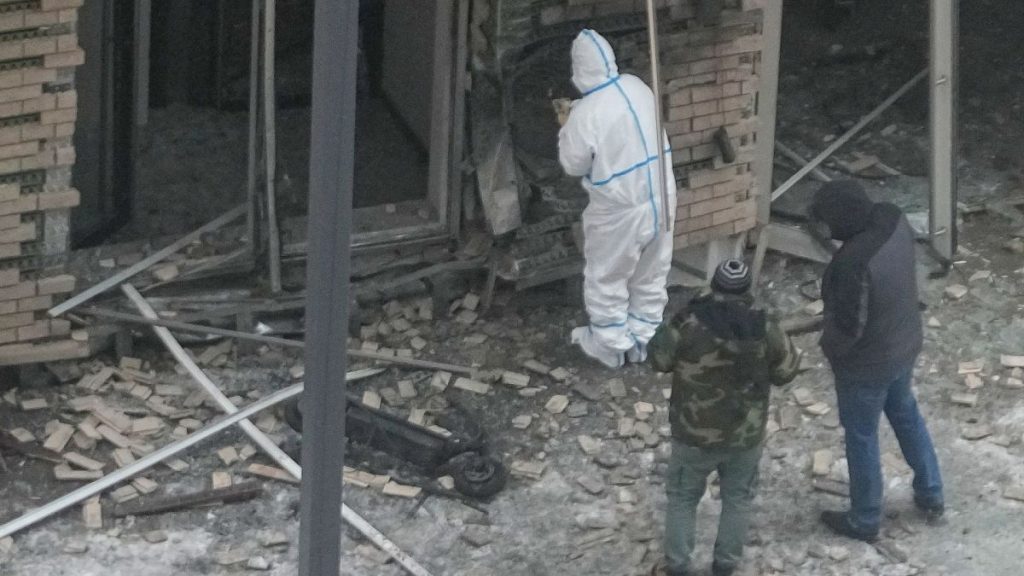The recent arrest of four Russian nationals by the Federal Security Service (FSB) has sent shockwaves through the already tense atmosphere surrounding the ongoing conflict between Russia and Ukraine. The FSB, Russia’s primary security agency, alleges that these individuals were complicit in a Ukrainian-orchestrated plot to assassinate high-ranking officials within the Russian Ministry of Defence. This revelation comes mere days after the audacious assassination of Lieutenant General Igor Kirillov, a prominent figure in the Russian military, further escalating the conflict and blurring the lines between battlefield engagements and targeted attacks within Russia’s borders.
The FSB’s announcement, disseminated through Russian state-controlled media, outlined the intricate nature of the alleged assassination plots. Two distinct methods were reportedly planned: one involving a car bomb detonated remotely, and the other utilizing an explosive device concealed within an envelope. While the intended targets remain undisclosed, the very nature of these alleged plans points to a calculated effort to destabilize and demoralize the Russian military leadership. The FSB’s accompanying video footage, depicting the arrests and subsequent interrogations, adds a layer of visual confirmation to their claims, although the identities of the detained individuals remain shrouded in secrecy. This lack of transparency raises questions and fuels speculation, adding to the already heightened tensions between the two nations.
The assassination of Lieutenant General Igor Kirillov serves as a stark backdrop to these recent arrests. Kirillov, who headed Russia’s Radiation, Biological and Chemical Protection Forces, was killed by an explosive device planted on an electric scooter outside his Moscow apartment. This brazen attack, claimed by Ukraine, marked a significant escalation in the conflict, bringing the war directly to the Russian capital. Kirillov’s death, along with that of his assistant, underscores the increasing vulnerability of even high-ranking officials within Russia, raising concerns about internal security and the potential for further targeted attacks.
The FSB’s subsequent arrest of an Uzbekistani national in connection with Kirillov’s assassination further complicates the narrative. The agency claims the suspect confessed to being recruited by Ukrainian special services, implying a broader network of operatives working against Russian interests within its own borders. This alleged connection to Ukrainian intelligence deepens the divide between the two countries and adds fuel to the fire of accusations and counter-accusations that have characterized the conflict.
The timing of these arrests, so close to Kirillov’s death, underscores the gravity of the situation. It suggests a concerted effort by Russian security forces to uncover and dismantle what they perceive as a network of Ukrainian agents operating within Russia. President Putin’s public condemnation of Kirillov’s assassination, characterizing it as a “major blunder” by Russian security agencies, underscores the political ramifications of this incident. His call for improved security measures highlights the Kremlin’s concern about the potential for future attacks and the need to strengthen its internal defenses.
The incidents represent a dangerous escalation of the ongoing conflict between Russia and Ukraine. The alleged assassination plots, the confirmed killing of a high-ranking general, and the subsequent arrests paint a picture of a shadow war being waged alongside the conventional military conflict. The lack of transparency surrounding the details of these events, coupled with the charged political rhetoric from both sides, makes it difficult to ascertain the full truth. However, the very existence of these allegations raises serious concerns about the potential for further escalation and the increasing blurring of lines between conventional warfare and targeted assassinations. This volatile situation demands careful observation and analysis, as it has the potential to significantly impact the trajectory of the Russia-Ukraine conflict and its broader geopolitical implications. The international community must remain vigilant and strive to de-escalate tensions, urging both sides to exercise restraint and pursue diplomatic solutions to prevent further bloodshed and instability. The threat of escalating covert operations and targeted killings within sovereign territory poses a grave danger, not only to the countries directly involved but also to the wider region and the international order.














